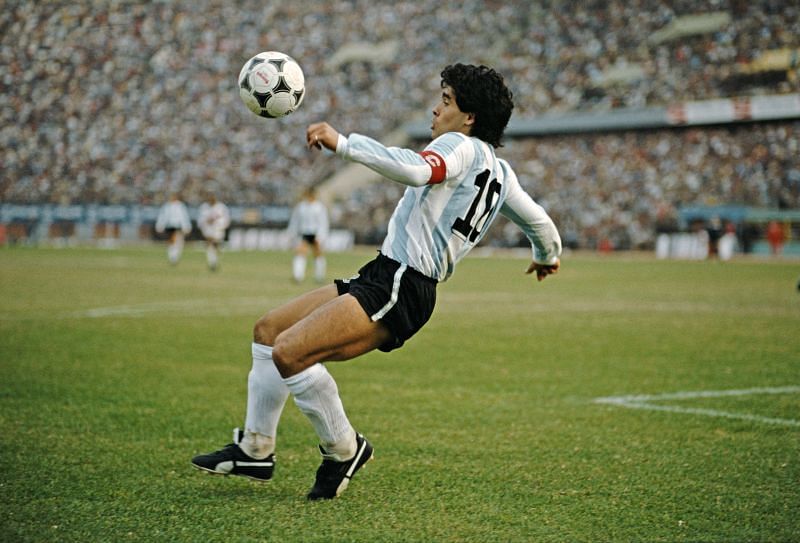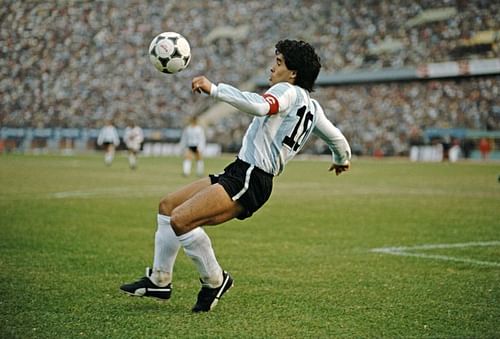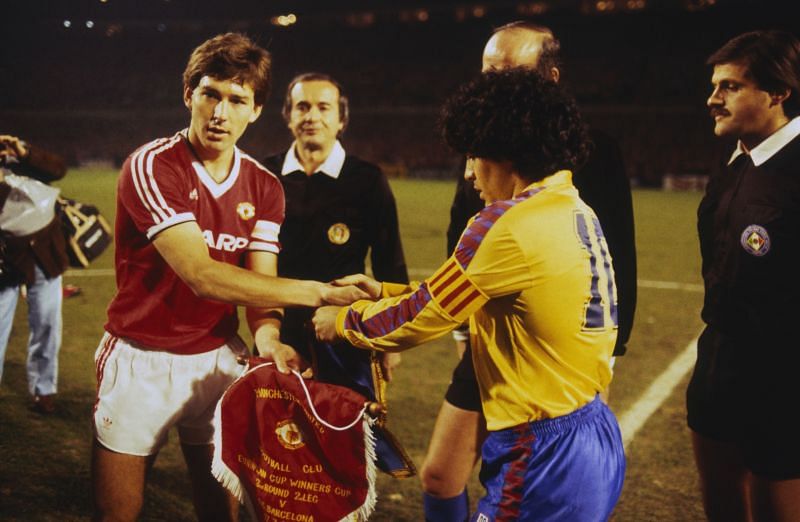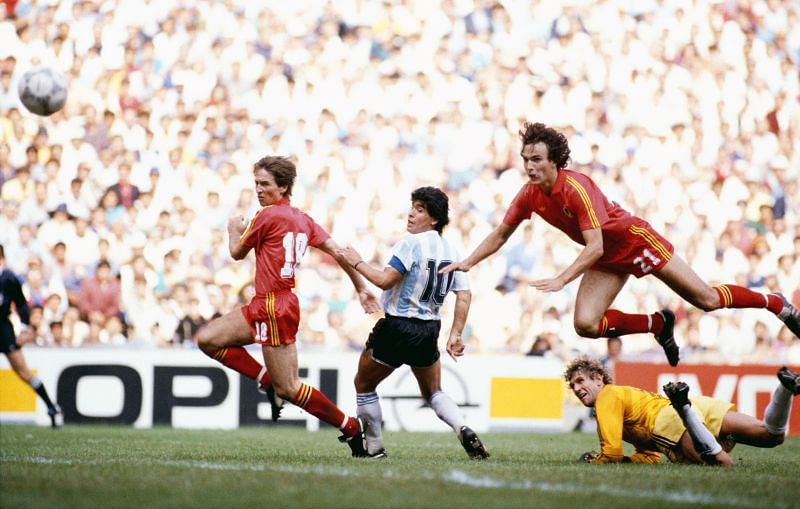
"I am Maradona, who makes goals, who makes mistakes" - an ode to history's finest

Like most other aspects of sport and life, every era in football's glorious history is defined by breathtaking moments that carve a unique legacy in the annals of the sport. Diego Armando Maradona's otherworldly achievements in the 1986 World Cup ensured that football would never be the same again.
As a young boy in Argentina, Diego Maradona grew up an ardent fan of Boca Juniors and started out as a 12-year-old ball boy in his adolescent years. Maradona had a unique instinct with the ball and was popular among fans at the stadium for his sorcery on the pitch during half-time. Little did they know that the youngster's special little show would be a precursor to the most famous warm-up routine in the history of sport.
Diego Maradona was ever the maverick in his early days and it took only a few minutes into his debut for Argentina's Golden Boy to make headlines across the country. The prodigious talent's nutmeg on Juan Domingo Cabrera is now a part of Argentine football folklore and was the first of many such fascinating stories that created Maradona's legend.
With Argentina primed for its next messiah after a triumphant 1978 World Cup campaign, Diego Maradona was touted as the lynchpin of a new-look Albiceleste outfit in 1982 but could only show glimpses of his precocious ability in the tournament.
Maradona enjoyed a string of excellent formative seasons in Argentina and was introduced to Europe by Spanish giants Barcelona in 1982. The forward predictably took to European football like a fish to water but was hampered by injuries during his time in Spain.

As far as reputations on the pitch are concerned, Diego Maradona could infuriate as easily as he could amaze. The Argentine's famously furious clash with the Athletic Bilbao squad in 1984 culminated in a massive brawl on the pitch and effectively ended Maradona's time at Barcelona.
Diego Maradona's larger-than-life personality never seemed to sit well with Barcelona's executives and his record transfer away from the club marked a massive turning point in the legendary Argentine's career. Maradona's time at Barcelona was not considered a success but the fact that he scored 38 goals in an injury-ridden 58 games in Spain is a testament to his exceptionally lofty standards.
Diego Maradona - the saviour of Naples
In the general context of Italian football, Napoli play an intriguing role that is representative of an emotion that has historically been dominant in southern regions of the country. The economic discourse in Italy has always been dominated by a north-south divide that has permeated the sport over decades of fierce rivalry. The Italian economy had been historically dominated by northern parts of the country and Naples was in no mood to accept the status quo.
When Diego Maradona decided to represent Napoli in 1984, the city erupted with sheer joy. The people of the city considered Maradona's arrival as an emblem of the ensuing power shift and resonated with the Argentine superstar's eccentric nature both on and off the pitch. It was a match made in heaven.
Diego Maradona captained Napoli to their first-ever Serie A title in the 1986-87 season and the victory had a transformative impact on the southern part of the Italian peninsula. Following Napoli's victory parade, sports journalist David Goldblatt was in awe of Maradona's status in the city and perfectly encapsulated Napoli's historic moment.
"The celebrations were tumultuous. The world was turned upside down. The Neapolitans held mock funerals for Juventus and Milan, burning their coffins, their death notices announcing, 'May 1987, the other Italy has been defeated. A new empire is born.'"
Diego Maradona reached the peak of his career in Italy and went on to spend several successful years in Napoli. The Argentine legend went on to win another Scudetto at the club and also won the Coppa Italia in 1987.
Maradona's impact on Italian football was so profound that many of his contemporaries at the time paid glowing tributes to the Argentine wizard, despite playing for rival clubs. AC Milan's legendary defensive duo of Franco Baresi and Paolo Maldini claimed that Maradona was the best player they had ever faced.
Juventus star Michel Platini - a player comparable to the great Maradona himself in the Bianconeri's eyes - went a step further:
"Diego was capable of things no one else could match. The things I could do with a football, he could do with an orange."
The 1986 World Cup - Diego Maradona's magnum opus

Diego Maradona was, in essence, a magician. The Argentine's surreal exploits on the pitch transcended the realm of sport and created moments that left viewers and opponents alike dazed, infuriated, baffled, and overwhelmed by splendour in a timeframe that was inexplicably difficult to fathom.
Unlike the 1982 World Cup, the 1986 edition of the tournament saw a different Diego Maradona. The Argentine playmaker had plied his trade in a combative and competitive Serie A for over two years and was now used to the violent approach that defenders generally adopted to nullify his genius.
Argentina were in the middle of a difficult transition at the time with inspirational veteran Daniel Passarella hanging up his boots days before his country's first game. Diego Maradona was Argentina's lone warrior in a tournament peppered with powerful and well-drilled teams.
What followed, however, was nothing short of a historic obliteration. After exceptional performances in the group stages, Diego Maradona singlehandedly dismantled Belgium and England to propel Argentina to the tournament's showpiece event.
Maradona's second goal against England, in particular, is widely regarded as one of the best goals in football history and was aptly nicknamed "the goal of the century" by contemporary journalists.
As with all things Maradona, Argentina's historic game with England was as marred with controversy as it was illuminated with sheer quality, with the legendary Napoli star predictably in the limelight.
Maradona's life post his retirement has been subjected to plenty of dissection and investigation - sanctioned or otherwise - over the years. Diego Maradona's larger-than-life persona both on and off the pitch did take its toll on the Argentine but his indelible impact on football made him one of the greatest sports personalities in history.
The evolution of football over decades of trials and errors has seen a number of visionaries take to the pitch and irreversibly change the way the game is played. The likes of Pele, Alfredo Di Stefano, Johan Cruyff, Michel Platini, and Zico played their part in making football a popular sport that reached every nook and cranny of the world. Diego Maradona, however, took the game's popularity to unprecedented heights and was arguably the first to truly transcend the sport.
After his controversial game against England, Diego Maradona brushed off remonstrations from the press with typical nonchalance. While Maradona's casual 'Hand of God' quip may have been a fleeting remark at the time, generations of fans across the world will definitively remember the great Argentine wizard for what he was to the sport and to the people of his country - a God.
Also Read: Sporting world pays tribute after Diego Maradona's untimely demise aged 60